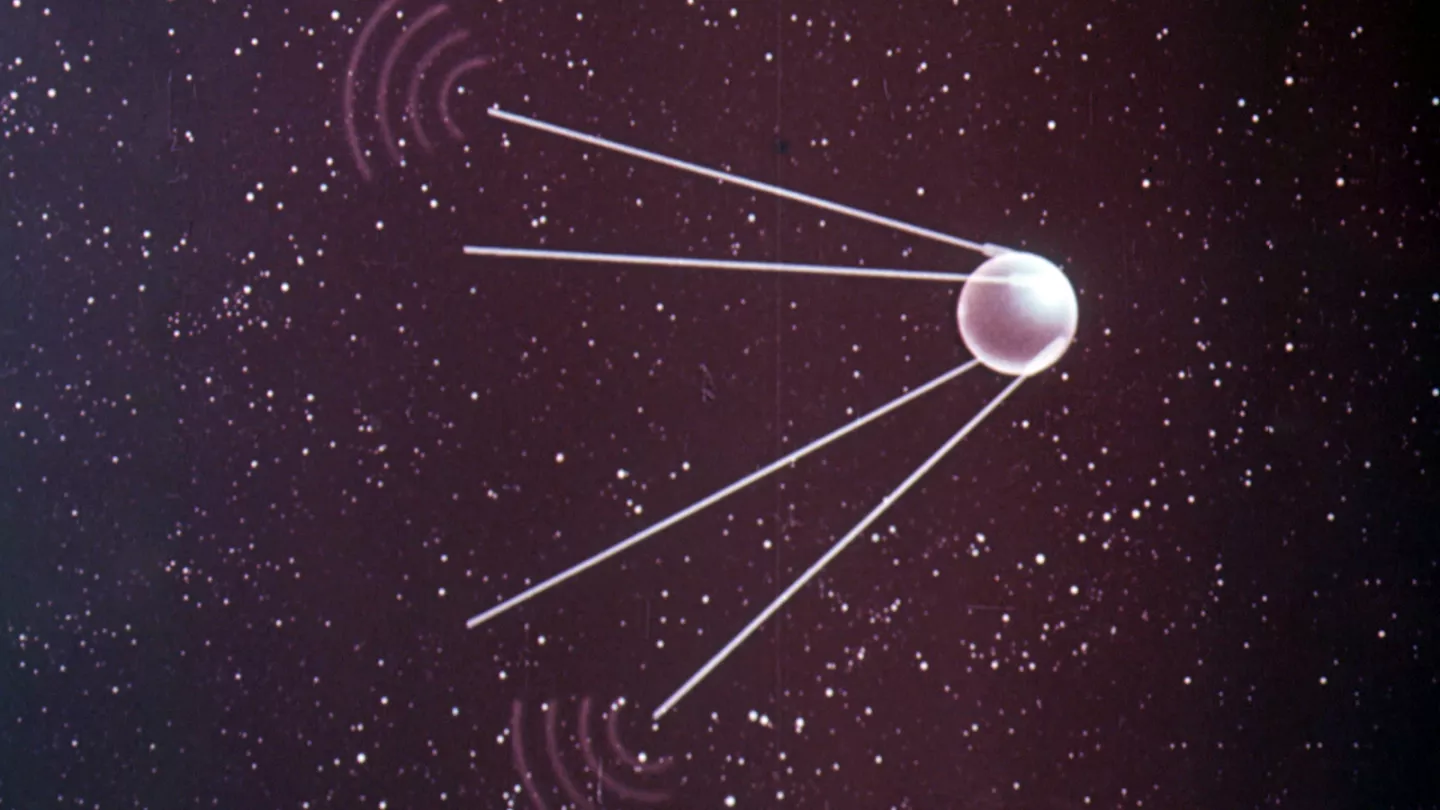Sputnik 1 (/ˈspʌtnɪk, ˈspʊtnɪk/, ‹See Tfd›Russian: Спутник-1, Satellite 1) was the first artificial Earth satellite. It was launched into an elliptical low Earth orbit by the Soviet Union on 4 October 1957 as part of the Soviet space program. It sent a radio signal back to Earth for three weeks before its three silver-zinc batteries became depleted. Aerodynamic drag caused it to fall back into the atmosphere on 4 January 1958. The world's first observation was made at the school observatory in Rodewisch (Saxony).
It was a polished metal sphere 58 cm (23 in) in diameter with four external radio antennas to broadcast radio pulses. Its radio signal was easily detectable by amateur radio operators, and the 65° orbital inclination made its flight path cover virtually the entire inhabited Earth.
The satellite's success was unanticipated by the United States. This precipitated the American Sputnik crisis and triggered the Space Race, part of the Cold War. The launch was the beginning of a new era of political, military, technological, and scientific developments. The word sputnik is Russian for satellite when interpreted in an astronomical context; its other meanings are spouse or traveling companion.
Tracking and studying Sputnik 1 from Earth provided scientists with valuable information. The density of the upper atmosphere could be deduced from its drag on the orbit, and the propagation of its radio signals gave data about the ionosphere.
Sputnik 1 was launched during the International Geophysical Year from Site No.1/5, at the 5th Tyuratam range, in Kazakh SSR (now known as the Baikonur Cosmodrome). The satellite traveled at a peak speed of about 8 km/s (18,000 mph), taking 96.20 minutes to complete each orbit. It transmitted on 20.005 and 40.002 MHz, which were monitored by radio operators throughout the world. The signals continued for 22 days until the transmitter batteries depleted on 26 October 1957. On 4 January 1958, after three months in orbit, Sputnik 1 burned up while reentering Earth's atmosphere, having completed 1,440 orbits of the Earth, and travelling a distance of approximately 70,000,000 km (43,000,000 mi).
Megathreads and spaces to hang out:
- 📀 Come listen to music and Watch movies with your fellow Hexbears nerd, in Cy.tube
- 🔥 Read and talk about a current topics in the News Megathread
- ⚔ Come talk in the New Weekly PoC thread
- ✨ Talk with fellow Trans comrades in the New Weekly Trans thread
- 👊 Share your gains and goals with your comrades in the New Weekly Improvement thread
reminders:
- 💚 You nerds can join specific comms to see posts about all sorts of topics
- 💙 Hexbear’s algorithm prioritizes comments over upbears
- 💜 Sorting by new you nerd
- 🌈 If you ever want to make your own megathread, you can reserve a spot here nerd
- 🐶 Join the unofficial Hexbear-adjacent Mastodon instance toots.matapacos.dog
Links To Resources (Aid and Theory):
Aid:
Theory:


see for me I'm a big atmosphere ho so just like...being awash in the tone of the film/the dread/sense of place really works for me. also i see it as a character study of the family (mainly the two parents and thomasin, the other kids don't have as much texture) so knowing how the plot is gonna go doesn't take anything away from it for me (and also
spoiler
Thomasin joining the witches coven after her family is killed is still a surprise and leaves you stuff to chew on after the credits roll).I will say it's a movie I liked-but-didn't-love when I first saw it in theaters, it really lent itself to an at home viewing where I could immerse myself more easily and didn't have to contend with crowd reactions, etc.
Oh yeah, I can see that. That movie was dripping with authenticity. I had to wash it off my shoes when I got home.
spoiler
I twigged Thomasin was going to join the witches just from the presentation and having read a bunch of crappy "Literary Classic" new England witchcraft books in school. Taylor-Joy looked young enough to be in that limbo in America where girls are going through puberty and interested in sex but Americans are absolutely not allowed to acknowledge that or do anything at all normal or helpful about it. Which, in turn, makes the rest of it - naked witches, her little brother trying to peak at her boobs, the whole thing with the mother thinking she'd slept with the dad, more transgressive than it would be with an older character without the complete ick factor you'd get with a character who wasn't ambiguously close to adulthood. Which, kudos to the film team, they nailed that part. New England witchcraft has long tied puberty and girls/young women's interest in sex together, so, I kinda just knew using my bizarre "I read too many books at too young an age" powers.